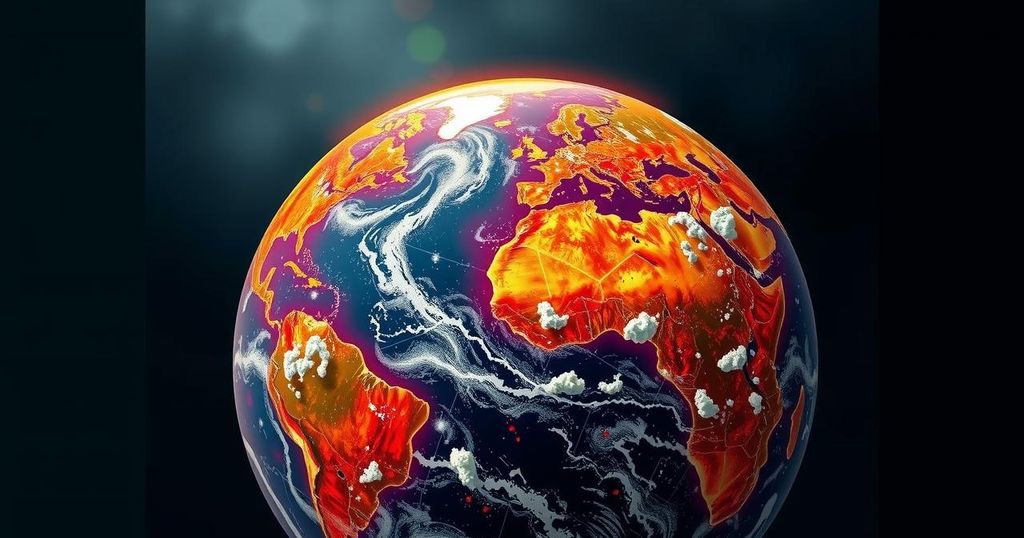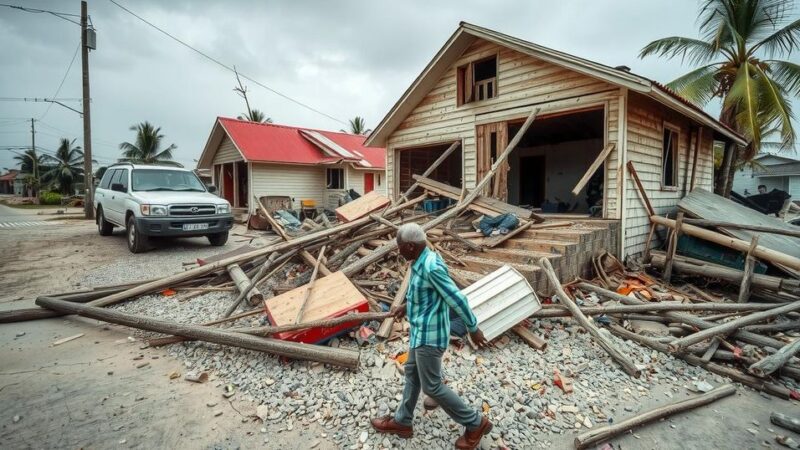The “10 New Insights in Climate Science” report reveals alarming trends in global warming, with temperatures in 2023 posing significant challenges to climate targets set by the Paris Agreement. The insights, based on contributions from 80 researchers globally, underscore the urgency of addressing methane emissions and enhancing resilience through climate finance. Increasing extreme weather events and economic costs associated with climate change are leading to a pressing need for equitable policy solutions and robust climate action leading into future climate negotiations.
The recently published report titled “10 New Insights in Climate Science” by Future Earth, The Earth League, and the World Climate Research Programme, compiles findings from a global network of researchers. This year’s report is especially relevant as it highlights the alarming rise in global temperatures, with 2023 witnessing an increase of 1.45 degrees Celsius over pre-industrial levels. Furthermore, global sea temperatures have set consecutive monthly records, signaling a pressing need to address climate change. The Global Stocktake (GST) assesses our progress towards the Paris Agreement goals and reveals that the world is falling significantly behind in efforts to limit the temperature increase to 1.5 degrees Celsius. The GST recommends a substantial ramp-up of renewable energy capacity and energy efficiency improvements to counteract climate impacts. Currently, the required reductions in global emissions are stark: to meet the 1.5-degree target, emissions must decrease by 42% more than projected by 2030, while limiting warming to 2 degrees necessitates a further 28% reduction. This year’s report also underscores the growing frequency and intensity of extreme weather events attributed to climate change. Notable examples include wildfires in Canada, now twice as likely due to rising global temperatures, and heatwaves in South Asia, which have increased in probability by thirty times. The report identifies atmospheric methane as a significant contributor to short-term temperature increases, advocating for urgent policy changes aimed at methane reduction. In a more positive light, a decline in atmospheric aerosol levels, primarily due to successful air quality policies, is noted, albeit with the understanding that this may lead to accelerated warming. Moreover, the report highlights the concerning reality that millions of people, particularly in lower-income regions, are currently residing in climate conditions that exceed the historical ranges of habitability. The impacts of extreme heat on vulnerable populations, including pregnant women and infants, are increasingly severe. The report further discusses the economic repercussions of climate change-driven natural disasters, underscoring that the intensity of natural events, such as El Niño, may amplify due to a changing climate, potentially costing hundreds of trillions of dollars by the century’s end. In conclusion, the report stresses the necessity for more robust climate finance aimed at enhancing adaptability and resilience of infrastructure to prepare for future climate challenges. Essential insights regarding climate-resilient development highlight the urgent need for effective energy transition strategies and policies that embrace fairness to foster widespread acceptance and action. The authors express their desire for these insights to guide policymaking at future climate conferences, such as COP29, with the hope of establishing significant financial commitments and measurable emissions reduction targets. The overarching aim remains to mobilize efforts against climate change, advocating for immediate and comprehensible steps toward a more sustainable and resilient future.
The report “10 New Insights in Climate Science” is an annual document produced by Future Earth, The Earth League, and the World Climate Research Programme, consolidating findings from leading climate science researchers worldwide. This year’s edition notably reflects upon the ongoing global temperature rise and the implications it poses in the context of the Paris Agreement goals, particularly emphasizing the need for actionable strategies to curb climate emissions. The findings are crucial in understanding the multifaceted impacts of climate change, including the increased severity of weather events, threats to human health, and economic challenges across various sectors. Through this report, the authors aim to inform and influence climate policy discussions on a global scale.
The “10 New Insights in Climate Science” report offers critical insights into the current state of climate change and emphasizes the urgent need for comprehensive policy reforms and financial commitments to mitigate its impacts. With evidence pointing towards record global temperatures and increasing extreme weather events, it is imperative for stakeholders to prioritize immediate actions on emissions reduction and climate resilience. The findings serve as a clarion call for both national governments and international bodies to collaborate and implement effective strategies to protect both vulnerable populations and global ecosystems.
Original Source: impakter.com







